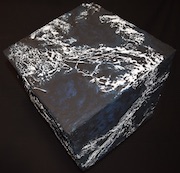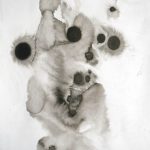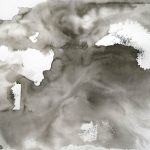Interview with Robert Rich for Catharsis e-zine, August 1998
1). Mr. Rich, why have you changed the sound of your style? The older stuff you’ve released in the past from your solo-stuff like Numena/Geometry, to your more recent collaborative works such as with S. Roach, Alio Die, and B. Lustmord is more “spaced-out” or ambient if you will…? Is this another side of Robert Rich?
I try not to repeat myself. Hopefully I change my sound a little bit with every release. Each album feels like a search, a new question to ask. Once I discover the musical form of the question, I want to move on. I’m more interested in questions than answers, since questions excercise our perceptions, whereas pretending to have answers can breed complacency.
Perhaps I oscillate a bit between dark slow music and brighter, more rhythmic and melodic music, just to keep myself on my toes. So for example, some of my earliest releases (like Trances/Drones) were quite abstract, then I moved into the more melodic and tightly composed style of Geometry or Rainforest; then in the mid-90’s I began to revisit some of the slow territory because I felt my vocabulary had increased to a point where I could discover something new; now I’m rekindling some melodic interests. It’s not a linear progression towards or away from anything, just an ongoing search for the ineffable.
The essential feature that stays the same throughout all my work is the requirement for personal honesty. Each album seeks to resolve a sound that I feel in my head, and that feeling becomes the only barometer against which I can measure the success of the music. The stylistic shifts from album to album simply echo the direction of personal inquiry in my life.
2). I tend to hear more of the Amoeba-type sound in Seven Veils. Is this how your solo-efforts/releases shall sound in the future?
Hmm… interesting. Perhaps because Seven Veils is a bit more guitar-heavy and very rhythmic, there might be a correlation with Amoeba, I don’t know. Remember that another album, Below Zero, came in-between Amoeba’s Watchful and Seven Veils, and I can’t imagine something more different sounding. It’s important to remember that Amoeba is a group project, and Rick Davies has a tremendous influence in the final result. I envision Amoeba as more song-oriented, while my solo work is more textural and sound-oriented. However, I have been quite interested in exploring traditional song forms lately, so perhaps there is a trend in that direction. Seven Veils is certainly a lot more melodic than any of my other recent work. The chances are, though, that my next solo album won’t sound anything like the next Amoeba album, nor like Seven Veils.
3). What type of equipment do you record on? Do you prefer using more traditional recording techniques?
I recorded my recent projects with ProTools and StudioVision on the Mac. Typically I bounce down to two ADATs for mixdown. I use a mixture of analog and digital. For example, I still prefer my analog Soundcraft mixing board, since it has a nice softness and “mushiness” that offsets some of the digital sterility. But I’m not a traditionalist. I use whatever tools I have available to obtain the sounds in my head. Many times I will start with an acoustic texture, then process it using one of several techniques (either using DSP on the Mac or a matrix of outboard processors) hoping to discover something surprising. These techniques involve a lot of time and experimentation, but they can reap unique results.
I guess I do have a few traditionalist tendencies when it comes to sampling. I really don’t like using other people’s sounds, and I don’t take bits off other people’s albums. It’s not because I think it’s immoral or anything (although people should definitely credit their sources and pay them when appropriate,) it’s just that I would rather contribute new sounds to the world than recycle old ones. It’s all part of staying true to a personal aesthetic. Also I enjoy the process of playing real instruments as well as designing my own unique electronic timbres – it’s the only way to discover the sounds I’m seeking.
If I want to use instruments that I don’t know how to play, I would rather invite guests to contribute their playing, then I’ll edit their performance until it fits my musical needs. This also gives me the oportunity to work with some amazing musicians, like David Torn, Forrest Fang, and others.
4). A more personal note……Your music tends to invoke images of simple- yet-complex beauty and somewhat religious significances, at least to myself. Do you believe in any spriritual entities?
Well, it’s an area people tend to misunderstand so easily, that I prefer not to talk a lot about it. Let’s just say that I feel a meaning that pervades our existence. It lies in the realm of personal, internal experience. I try to reflect my own experience in the music, trying to show it in the interrelationship of the various parts, in the energy of the timbres and melodies, hopefully invoking that rush of energy inside me that reminds me why I’m here. I am not very interested in religions or belief systems, but rather in honing my own ability to feel things directly.
5). Will there be any future collaborative efforts with any other artists on H.O.S./Fathom?
I’ve no plans at the moment, but I’m open to anything. Choosing collaborators is not always a premeditated excercise. Sometimes a collaboration just feels right, and that has a lot to do with timing, stylistic directions and such. Currently Amoeba is taking most of my collaborative muscle, and most of my other interests lead me in solo directions. But if the right person came along at the right moment, I would be happy to veer off into the directions that might suggest.
6). When I spoke to Sam Rosenthal on the last Black Tape tour, he mentioned he listened to a lot of HOS/Fathom artists, which I seconded. Do you know of a lot of people who enjoy this genre’ of music? Do you feel ambient/tribal/world-music has grown over the past 10 years?
I have so little concept of “genre” … I don’t think in terms of movements or the unified growth of a scene. If a community has developed between musicians making this type of music, it grew more out of bonds of friendship than any stylistic vocabulary. We’re just a bunch of iconoclasts making music that appeals to us. (To quote Daevid Allen, “We’re a community of hermits.”) If others choose to follow a similar thread, perhaps that means we’ve tapped into something universal. We’re all just trying to make music with energy, something deep and true, something that tickles the neurons in a special way.
I’m happy and often surprised that my work has appealed to so many different types of people. I really don’t have any conception of the demographics for my work. My audience seems to range from ravers, goths and dada post-industrialists all the way through to hackers, Baby Boomers and little old ladies. Perhaps at some point people will stop wondering what to call it and just respond to sounds that move them. In any case, I’m always glad when people listen.
7). Seven Veils is your latest release. Will you continue to work with this “middle-eastern” flavor present on Seven Veils?
I guess the music of Islamic cultures has soaked into my blood, but it’s not my only influence. I’m seeking an ecstatic musical vocabulary, and so I gravitate towards musical traditions that have developed and refined the role of ecstacy in music. I love the sinuous subtlety of the melodic development in Persian, Arabic and Indian music, and I wish I had an extra lifetime to devote to its study. But you can find ecstacy in music wherever you look, whether it’s Bach, Terry Riley, the Velvet Underground, Sun Ra or the Orb. If you listen carefully to Seven Veils you’ll notice that the Middle Eastern thread is subdued under the fabric of the music. I don’t want to create a stylistic pastiche of undigested cultural references. Hopefully, the music sounds integrated into a complete self-referential entity… in the end, it should just sound like itself.
8). You seem to take your time on releases. Is this for perfection in recording/mixing process, or is this because it is how you work?
That’s funny, other people say I’m prolific. Actually, I do work pretty slowly on projects, and I am definitely a tweaker. I’m also a bit of a workaholic. Seven Veils took me about 18 months from start to finish, however I did go on a 3 month tour and recorded Fissures and parts of Below Zero while working on it. It just takes time to develop some ideas until they feel complete.
9). Are you a “tour-person”? Do you enjoy the live atmosphere? Or, are you mainly a “studio-man”?…If you are a “tour-person”, will you be touring any for Seven Veils besides the Projekt Festival?
I trade off between studio and live, but lately I am probably more satisfied in the studio. I really enjoy playing live, but I don’t necessarily enjoy playing songs from my albums. Live performance is a lot more interesting when it presents a unique experience, different from the recordings. This year I have been performing a series of improvised concerts, mostly abstract and slow. These have been a lot more fun for me. On tour in ’96 and ’97, I did perform rough versions of some of the tracks on Seven Veils, but now that they are finished it will be harder to perform them – they’re so layered and complex. I could conceivably perform them in their final form, but it would require a lot more sequencing than I like to use. We’ll see what happens next year. I want to finish the new Amoeba album before I tour again, and it looks like that’s going to take most of this year.
10). One more question……Hypothetically… If you were stranded on a deserted-isle in the pacific, with no access to the outside world except electricity and you had the choice of having one musical instrument, what would it be?
A good piano. It’s the one instrument that I can truly improvise on, and I feel completely free within its constraints.






You must be logged in to post a comment.